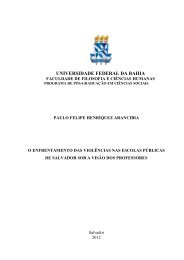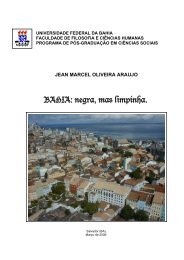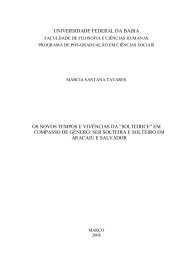Clique aqui para baixar o texto completo - Programa de Pós ...
Clique aqui para baixar o texto completo - Programa de Pós ...
Clique aqui para baixar o texto completo - Programa de Pós ...
You also want an ePaper? Increase the reach of your titles
YUMPU automatically turns print PDFs into web optimized ePapers that Google loves.
ABSTRACT<br />
With the initialization of the Brazilian Automotive Regime, in 1995, Brazil started attracting a<br />
new wave of investments in the automotive sector directed at the construction of new plants.<br />
The saturation of the consumer markets and the high costs of production in Europe and the<br />
United States ma<strong>de</strong> the major automakers target their investments to regions where they could<br />
find expanding consumer markets and qualified and cheap labor. That wave of investments<br />
was accompanied by fierce disputes among the states in the fe<strong>de</strong>ration with the aim of<br />
bringing those plants to their territories. Hence, in 1999, the government of the state of Bahia,<br />
by intruding in the American automaker Ford and the government of the state of Rio Gran<strong>de</strong><br />
do Sul, offering generous tax incentives as well as pressuring the fe<strong>de</strong>ral government, by<br />
means of its representatives in the Congress, in or<strong>de</strong>r to postpone the <strong>de</strong>adline for<br />
qualification, which had expired in May of 1997, so as to allow the automaker to have access<br />
to the foreseen tax advantages, was successful in its purpose of attracting the automaker to the<br />
state. The automotive complex is located in Camaçari, in the Metropolitan Area of Salvador,<br />
having started its operations in the year of 2001. In the following year, the first occurrences of<br />
workers with Repetitive Strain Injury (RSI) started taking place. Aspects concerning the<br />
organization of labor, such as the ergonomic conditions, the intense rhythm of the assembly<br />
line, the pressure for results, and the lack of breaks during the production are pointed out by<br />
both union lea<strong>de</strong>rs and workers as the main factors contributing to this health hazard. The<br />
object of this study is the relation between labor, illness and union action in the Ford Nor<strong>de</strong>ste<br />
Industrial Complex. This research aims to i<strong>de</strong>ntify the nature of the actions of the union that<br />
represents the metalworkers in regard to the occurrences of Repetitive Strain Injury, which<br />
attacks both the workers hired by the automaker and the outsourced workers in the automotive<br />
parts and components plants. The results that are presented are based on the use of<br />
quantitative data, such as the statistics surveyed by CEREST in Camaçari between the years<br />
of 2004 and 2007, the data referring to SRTE´s tax action on the automotive complex between<br />
the years of 2002 and 2007, as well as on qualitative data, such as semi-structured interviews<br />
conducted with workers and grassroot union representatives, and the use of secondary sources<br />
such as newspaper stories, national news magazines, and the analyses of union bulletins. The<br />
study that was carried out realized that <strong>de</strong>spite the significant number of workers that have<br />
been struck by the illness, other issues that were placed as challenges to union action since the<br />
beginning of the plant´s operation, such as increasing the sector´s wage floor, and the<br />
negotiations around the payment of profit sharing (PLR) did prevail in relation to the issues<br />
related to falling ill with RSI. This leads us to the conclusion that, in the case that was<br />
analyzed, the action of the union as far as the health of the workers is concerned has been<br />
sporadic and lacking in system, meaning that there are no clear or well-<strong>de</strong>fined strategies for<br />
tackling the problem.<br />
Key words: Automotive industry, worker health, labor, tra<strong>de</strong> union.









